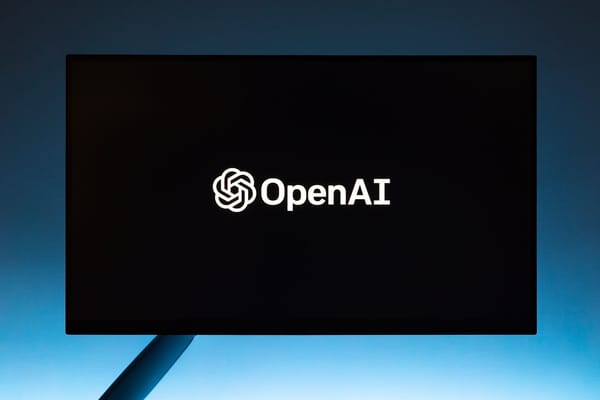17 Open-source and Free Headless eCommerce Solutions for PHP, Java, Python, and Node.js
Table of Content
A headless software is a program that can work and performs without a user interface. A headless Linux and a headless Google Chrome can perform seamlessly and smoothly without the need to run its GUI.
Likewise, a headless web system is a functional web app but without a user interface. Developers often use a headless web app as a base to build mobile, desktop, web, and IoT apps.
Examples of Headless solutions
- Headless Linux
- Headless Google Chrome
- Headless Database Backend Platform like Firebase
- Headless Content Management System CMS
- Headless eCommerce system
Our topic of the day is open-source headless eCommerce solutions for building eCommerce web, mobile, and desktop apps.
Developers can benefit greatly from these solutions. They can start building their eCommerce, shopping cart apps, and apps directly without worrying about backend development.
Headless CMS VS headless eCommerce
Headless CMS (Content Management System) solutions, which are designed for building CMS or general-purpose web and mobile apps. However, a headless eCommerce solution aims to aid in building complex eCommerce and digital shops solutions.
What can you do with a headless eCommerce system?
- Lower the cost of building an eCommerce system from scratch
- Minimize the development time and cost
- Provide all API functionalities to build eCommerce and digital shop solutions
- Build a personalized customer experience
- Build multiple storefronts on one base
- Manages and store all records: products, catalogs, configs, user data, pages, and more.
- Manages products, product catalog, archive from the back-office
- Handles all user authentications, authorizations
- Scale your store easily
Self-hosted Headless eCommerce VS Headless-as-a-Services eCommerce
Many services offer headless eCommerce services for a fee, which may seem cost-effective as they take out the headache of hosting, setup, update, upgrade, and security.
However, an open-source self-hosted headless system can serve furthermore as they allow you to own your data, avoid lock-in, and have better control of the system.
Enterprises can scale and extend your self-hosted thanks to experienced developers. As example, adding another payment gateway, or integrate a 3rd-party service.
Can you use a Headless CMS as a headless eCommerce solution?
Short answer, Yes, it is possible, but at a cost.
A Headless Content Management System (CMS) aids in building rich-content web, mobile or desktop apps.
Using it to build an eCommerce portal or a storefront requires custom setup, custom workflows (products, orders, inventory, shipping, payment), and effort/ time to integrate payment gateways, shipping services, and more.
On the other hand, Headless eCommerce solutions are packed with all infrastructure required for building eCommerce and business solutions. They often have built-in payment gateways and dozens of integration-ready tools.
Here, we will cover the best open-source headless eCommerce systems, with a primary goal to help developers choose the one that meets their requirements.
1- Flamingo
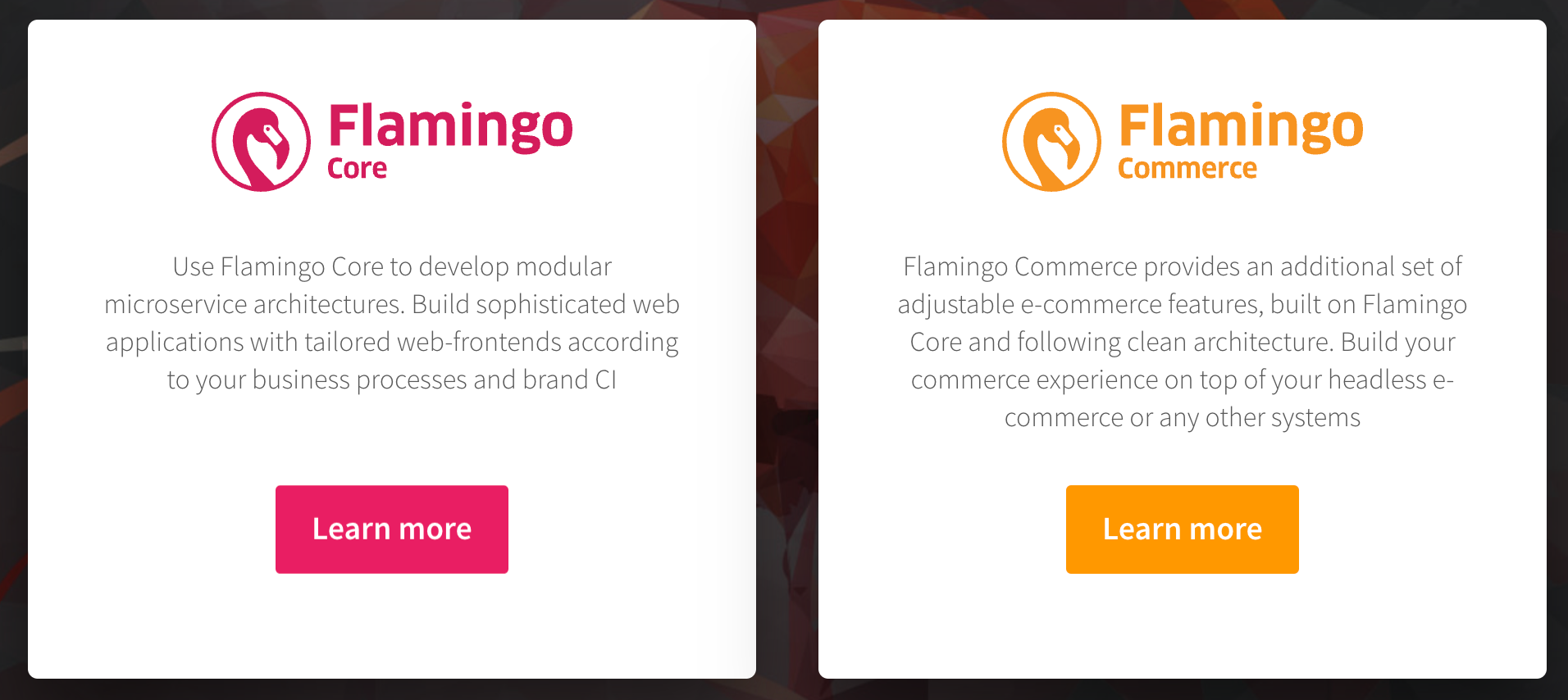
Flamingo is an open-source framework based on Go. It offers a clean and scalable architecture with speed. Flamingo Core package helps developers build complex web apps with custom front-end.
For eCommerce, Flamingo Commerce is an additional set of features and custom functions for building customized headless eCommerce solutions.
Although its API headless eCommerce is still in Beta, it gains the attention of Go developers in the past year.
Flamingo Commerce comes with custom eCommerce modules like products' management, products catalogs and categories, checkout, payment, and cart management. Flamingo Commerce follows the Domain-Driven Design model, which is suited for enterprise work.
Flamingo Commerce Highlights
- Microservice architecture
- Magento integration
- Easy to install
- Simple learning curve
- Authentication support
- Modular
- GraphQL support
- Web controller support
- Built-in localization
- Rich eCommerce modules: Product, Category, Cart, Checkout, Customers, Search, Price, Payment, and. Data layer.
2- Velox
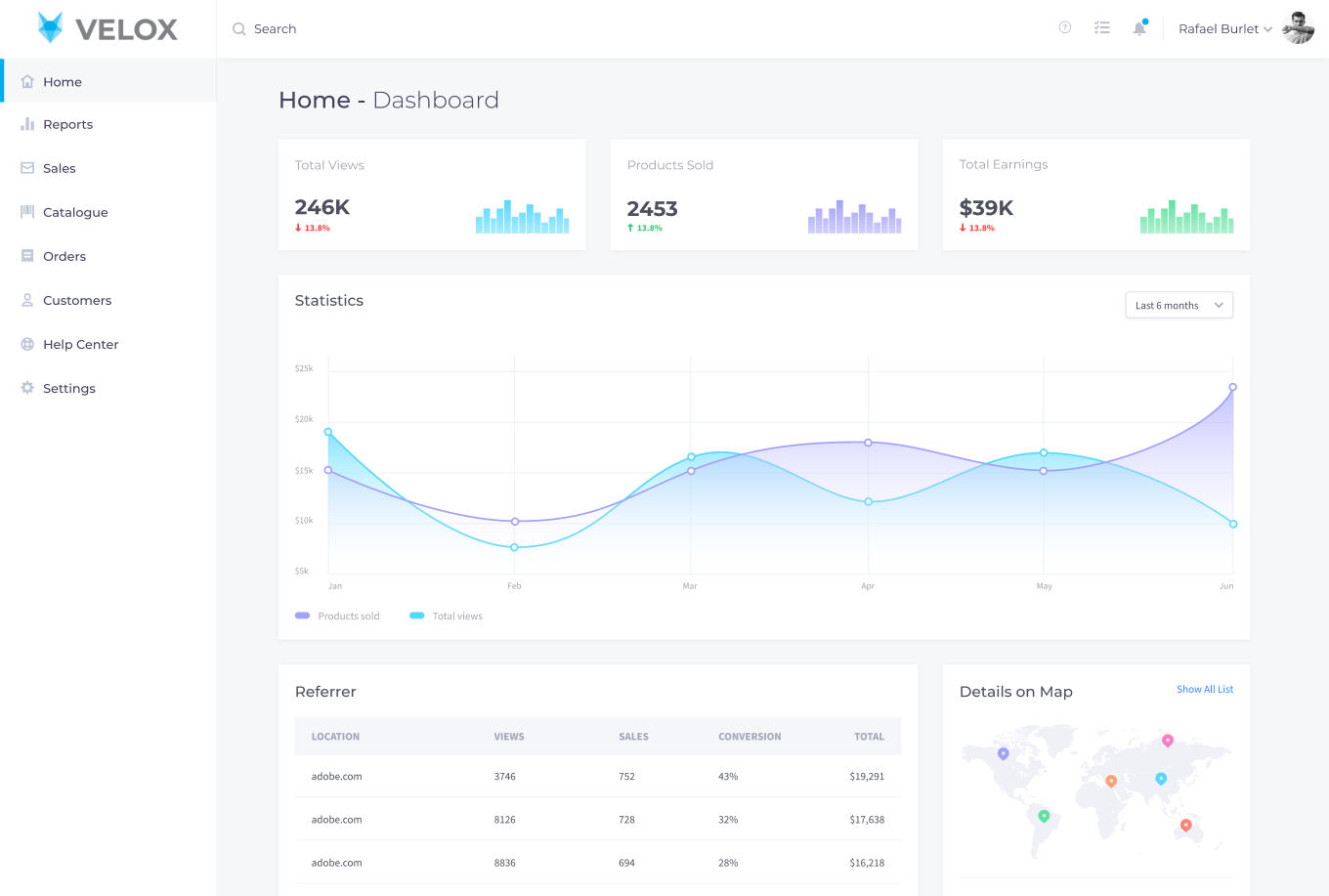
Velox is an open-source MIT-licensed headless eCommerce solution for the enterprise. It offers scalability, quality, and flexibility to integrate with other solutions and eCommerce services. Velox comes with B2B model support and a modular design which fits many use-cases.
Velox Highlights
- On-premises support
- Product catalog management
- Cart management
- Checkout management
- Live and real-time search based on Elasticsearch
- Manages registration, orders, authentication,
- Microservices support
- Integrate with many ERP systems
- Rich back-office
- No-license fees
3- Solidus

Solidus is yet another headless platform for building custom eCommerce solutions. It is an API-first platform with a fancy dashboard, mobile support, custom development options, and ready-to-scale features.
Solidus is built on top of the Ruby on Rails framework. That makes it benefits of Ruby and Ruby on Rails vast ecosystem.
Solidus Highlights
- Product catalog management
- Inventory management
- Taxonomy management
- RESTful and GraphQL APIs
- Payment management
- Tax calculation
- Offers payment integration for PayPal, Stripe, and Braintree
- Promotion engine
- Subscription management
- Credit
- Shipping management
4- Medusa
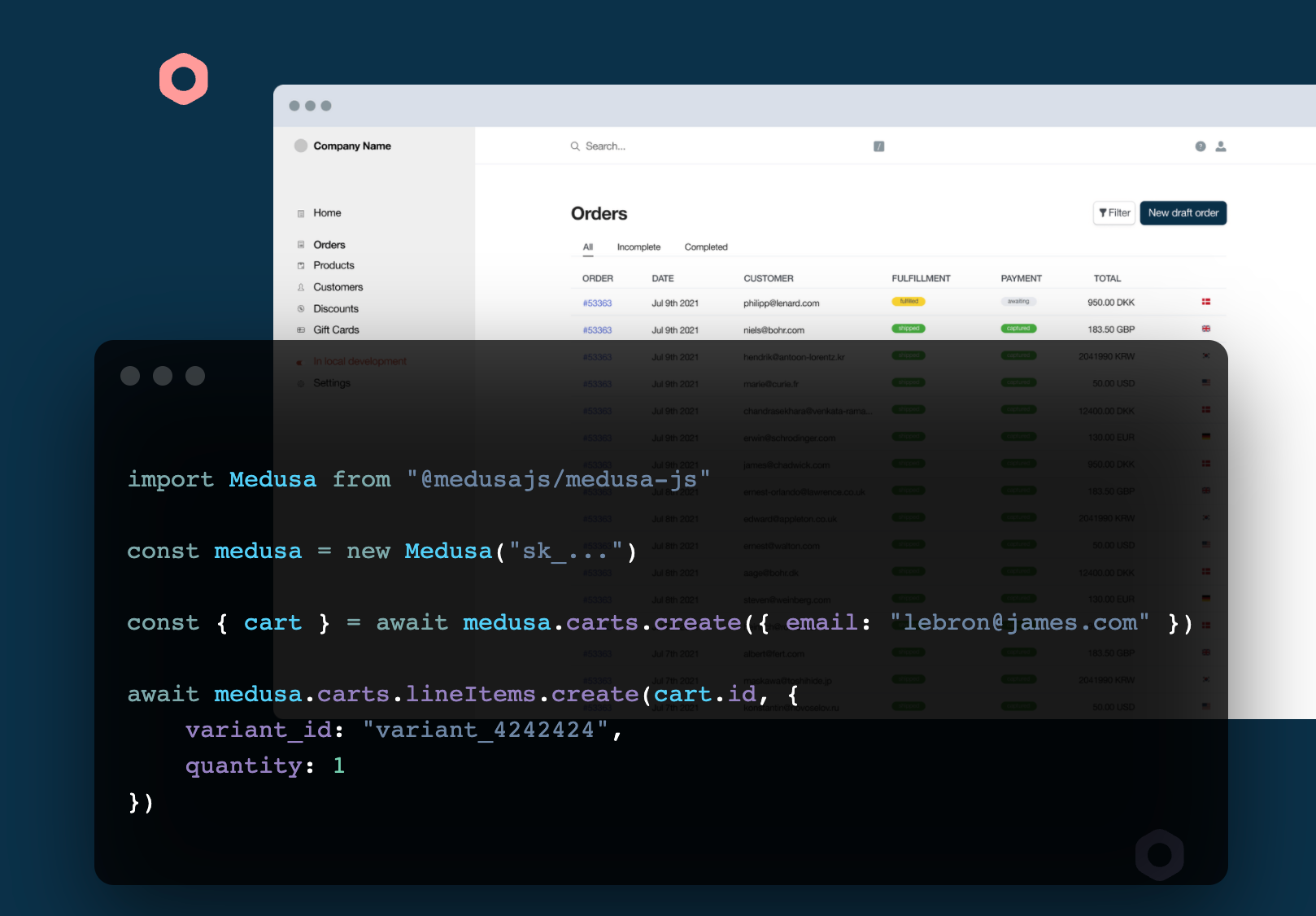
Medusa is an open-source headless eCommerce solution with a complete eCommerce workflow. Its workflow starts from managing products, customers, orders, shipping, and returns.
It also offers a notification API to follow and track all system events.
Medusa is released under MIT license as an open-source project.
It is built on top of Node.js and uses PostgreSQL and Redis.
Medusa Highlights
- Products management
- Customer management
- Orders management
- Discount manager
- Notification API
- Gift credits
- Multi-store setup
- Multi-languages support
- Advanced system-wide search
- Search filter
- Dynamic tables
- Easy-to-use Back-office
- Integrates smoothly with any CRM, PIM, ERP, and other software
- Highly customizable
5- EvenCart

EvanCart's developer describes itself as an open-source headless eCommerce for API fanatics. However, It is only one on this list that is GDPR/PCI-DSS compliant with its GDPR policies manager.
Developers can choose between SQLServer or MySQL during installation. EvanCart also offers HTML server rendering by default.
EvanCart is built on top of .Net Core and Liquid View Engine. It comes with a headless or a hybrid model as a web-based eCommerce system.
EvanCart Highlights
- Product catalogs management
- Multi-store support
- Multi-vendor support
- Multiple currency support
- An advanced reporting system
- Client and Server-side HTML rendering
- SEO custom fields for building SEO-ready web apps
- Modular system with dozens of plugins
- Multiple Countries, State, City level controls
- Multiple Language Support
- Tax management
- User and profiles management
- Payment methods processor
- Multi-warehouse management
- Country / State Shipment Restrictions
- Refund management
- Order management
- Order Cancellation management
6- Reaction
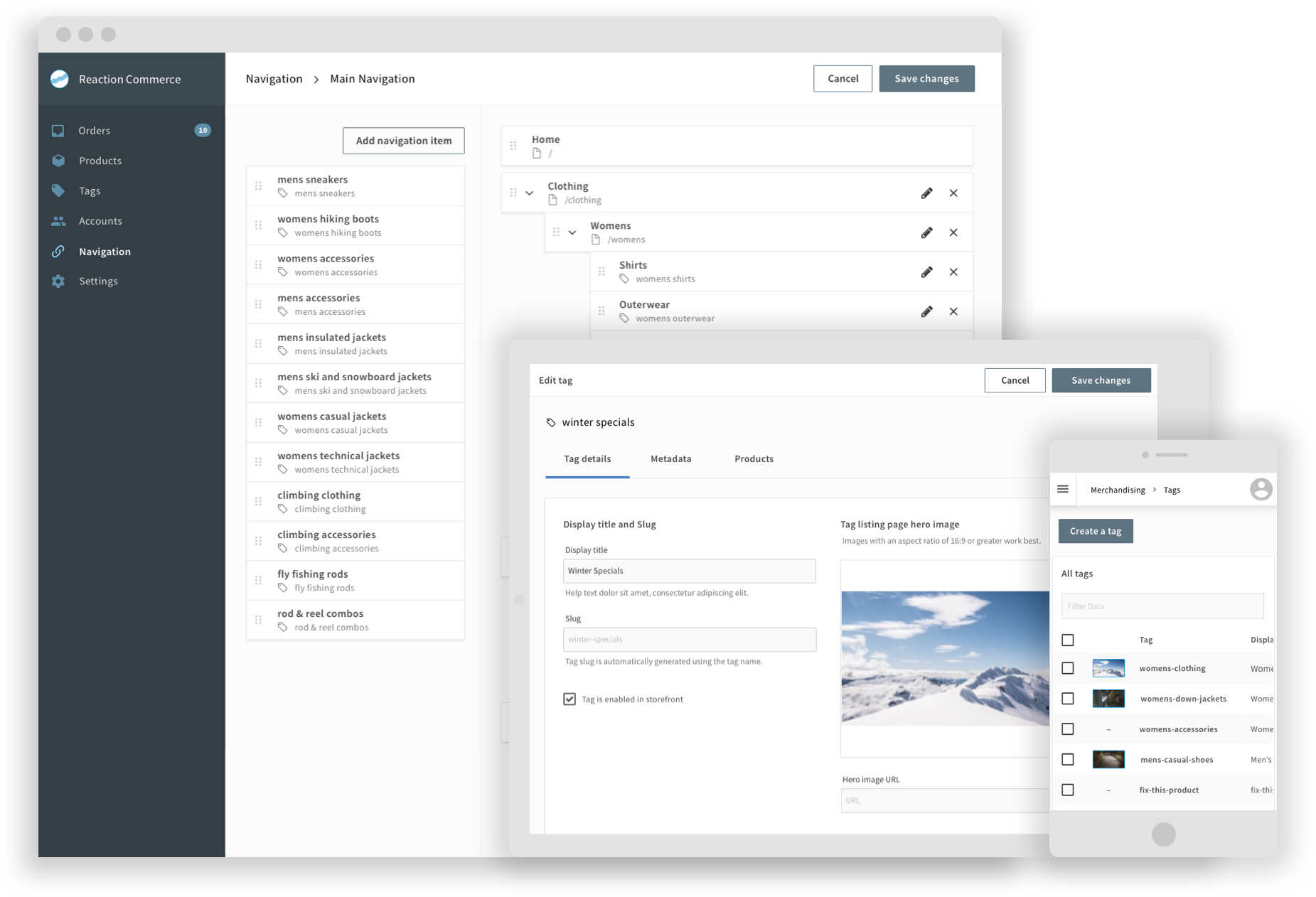
Reaction is an API-first headless eCommerce platform built with Node.JS and React.
Reaction comes with a rich dashboard that helps you to manage products, orders, product tags, accounts, navigation, and system settings.
With its navigation manager, Reaction offers a complex navigation system that supports multiple menu navigation.
It is released under GNU GPLv3 License.
Reaction Highlights
- GraphQL support
- Product management
- Orders manager
- MetaTag management
- Responsive dashboard with mobile view support
- Media upload
- Advanced navigation manager with multi-level hierarchy drag-and-drop management.
- Account management
- Extensible
- Docker support
- Kubernetes support
7- Spree
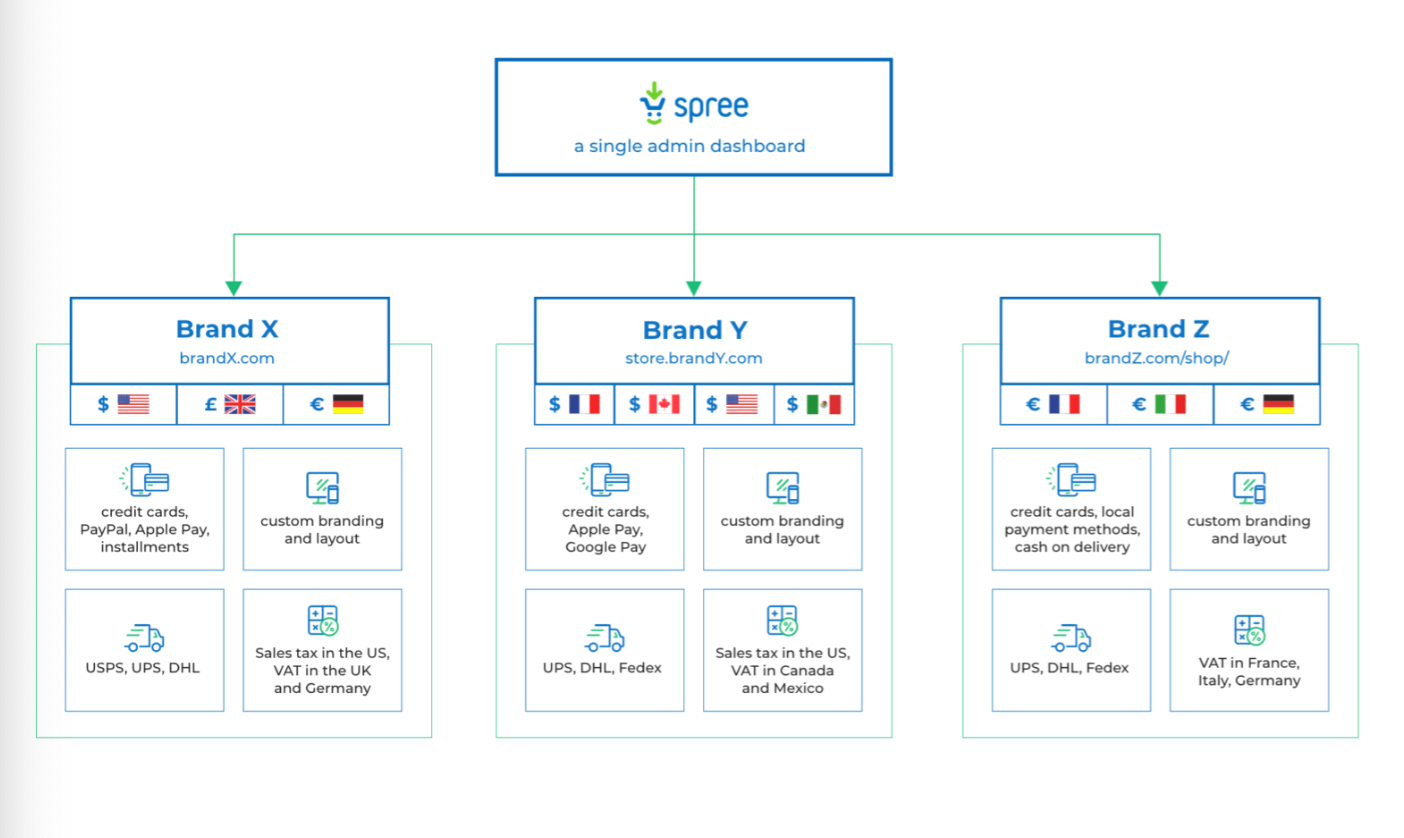
Spree is a headless eCommerce system based on Next.js Commerce. Spree offers JavaScript/ TypeScript SDK for developers and full integration with Vue Storefront allowing PWA user experience.
Spree highlights
- Single and Multiple brands support
- Multi-language support
- Single vendor and multi-vendor
- 3rd party integrations support
- React and Vue support
- Pre-built SDKs
- B2B eCommerce support
- Subscription management
- Ready to configure with many payment methods
- Supports many shipping services
- Accessibility compliance
- Responsive dashboard
- Email integration support
- SEO-ready
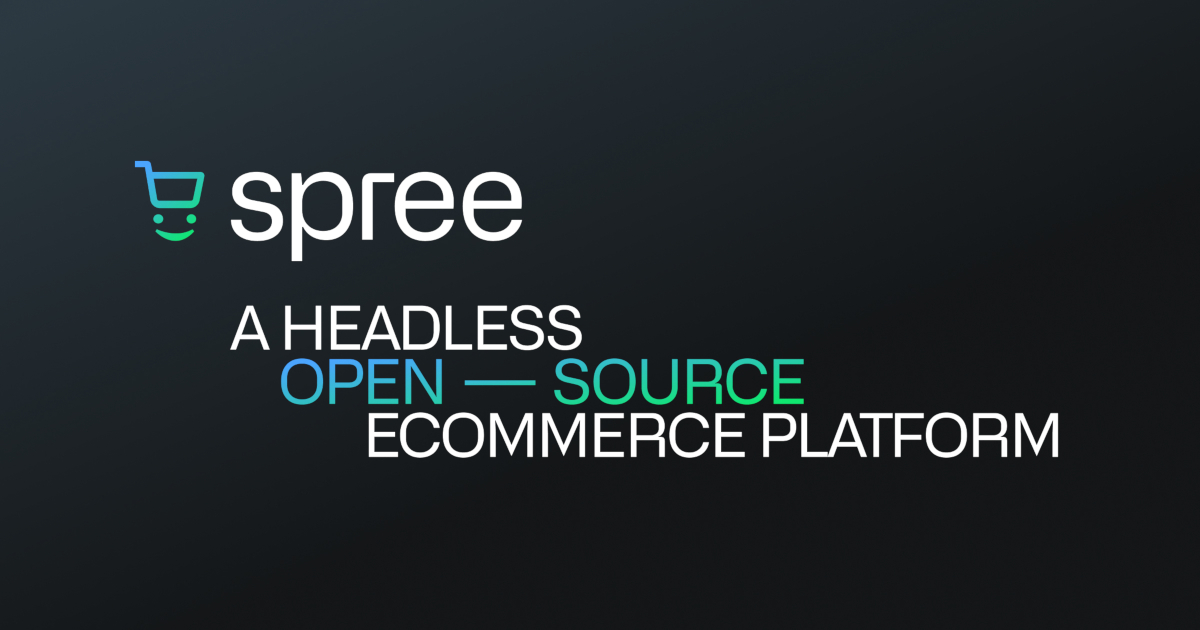
8- Bagisto
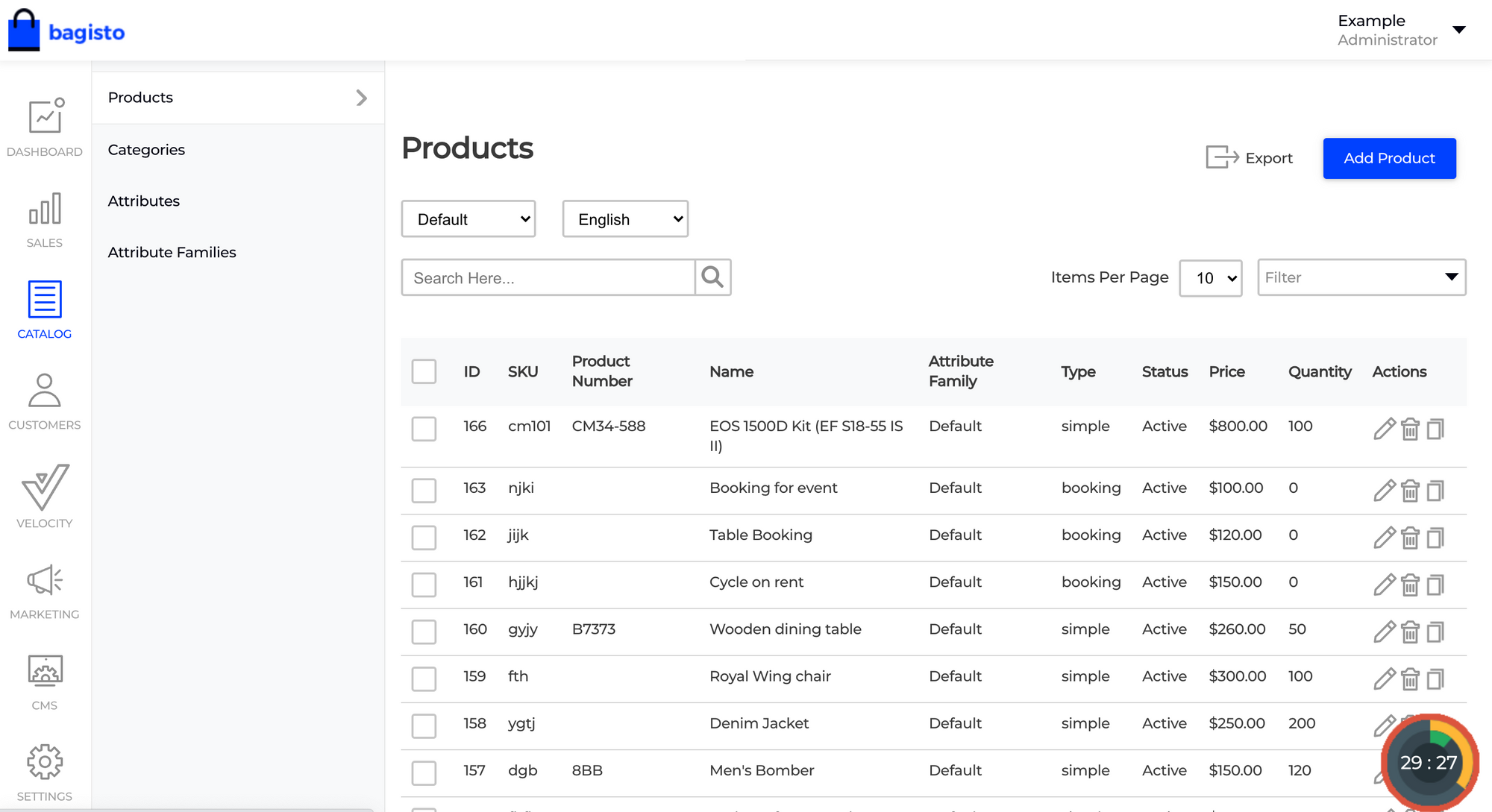
Bagisto is an open-source Laravel-based eCommerce solution. It has a set of useful enterprise-grade extensions that helps to develop a multi-tenant SaaS, multiple shops, B2B commerce.
Bagisto is a complete eCommerce system with a visual and headless mode.
Bagisto Highlights
- Multi-vendor marketplace
- Multi-store inventory support
- SEO fields
- Product images
- Product SEO
- Image search
- PayPal integration
- Customers and customer group management
- Categories
- Custom fields
- Insights and analytics
- localization
- Sales management
- Taxes support

9- Vendure eCommerce
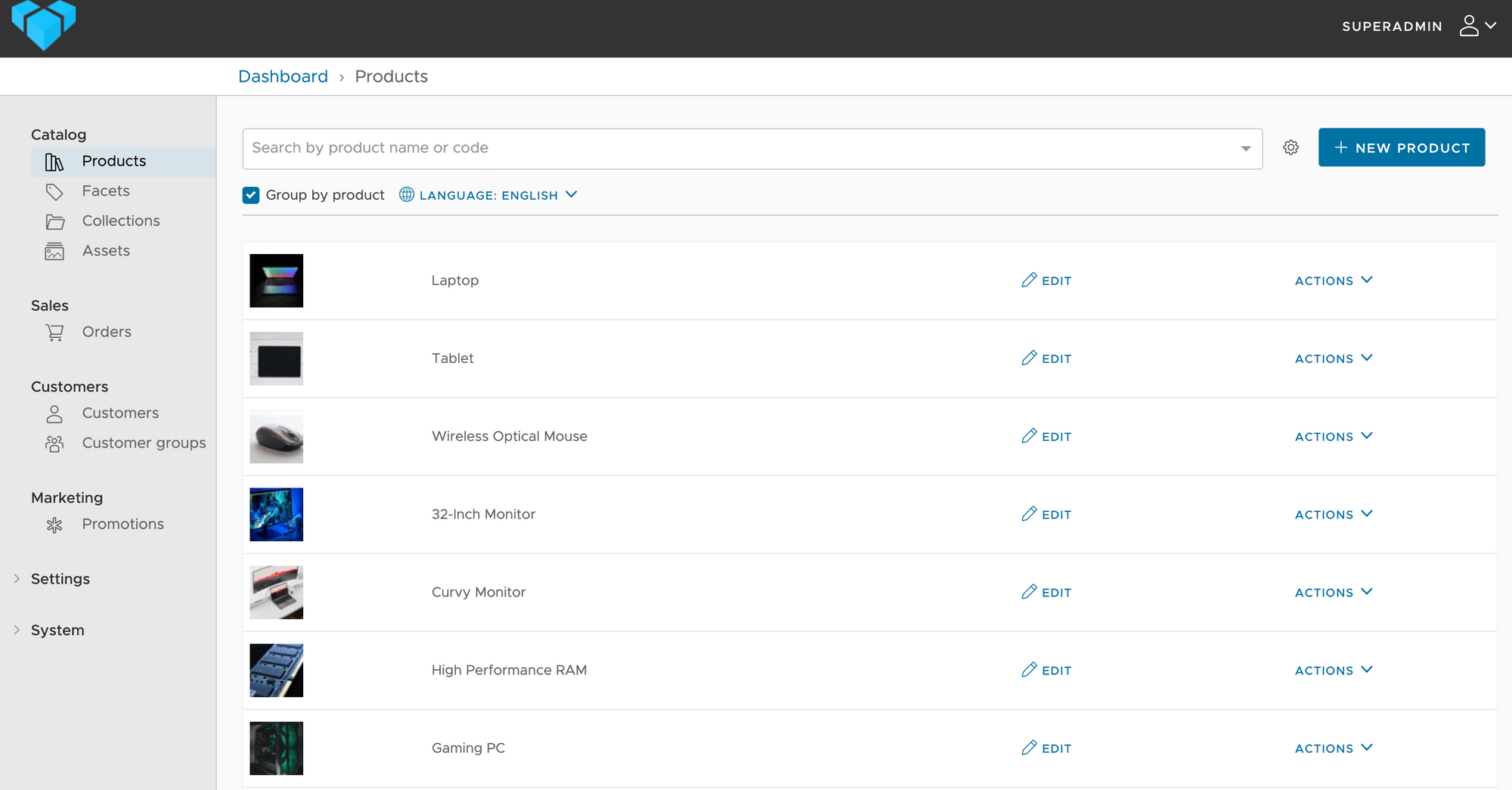
Vendure eCommerce is an open-source GraphQL-based eCommerce framework built with TypeScript and Node.js.
Unlike other systems here, Vendure offers two separate GraphQL sets: A storefront GraphQL API for building custom shots and an admin panel GraphQL API to build a customizable admin.
Vendure Highlights
- Manages products, collections, orders, customers, and promotions
- Multi-language support per product
- Sales management
- Simple and easy to use dashboard
- Images upload
- Product channels
- Product Custom attributes
- product variants
- Facets
- WYSIWYG editor
- Vast ecosystem
- Payment integration
- Supports Keycloak IAM and SSO (Single Sign-on)

10- Sylius

Sylius is a customer-centric headless eCommerce platform for mid-market and enterprise brands.
Sylius is built on top of the Symfony PHP framework. It may be the right solution for Symphony developers to scale, extend and customize.
Sylius offers two editions: Sylius basic open-source edition and Sylius Plus with more enterprise-specific features.
Sylius Highlights
- Multi-store system
- Many payment methods integration like PayPal, and Mollie
- Rich marketplace filled with free and paid plugins
- Rich development portal
- Ready to integrate with CRM, PoS, ERP, CMS, and accounting solutions.
11- Salor
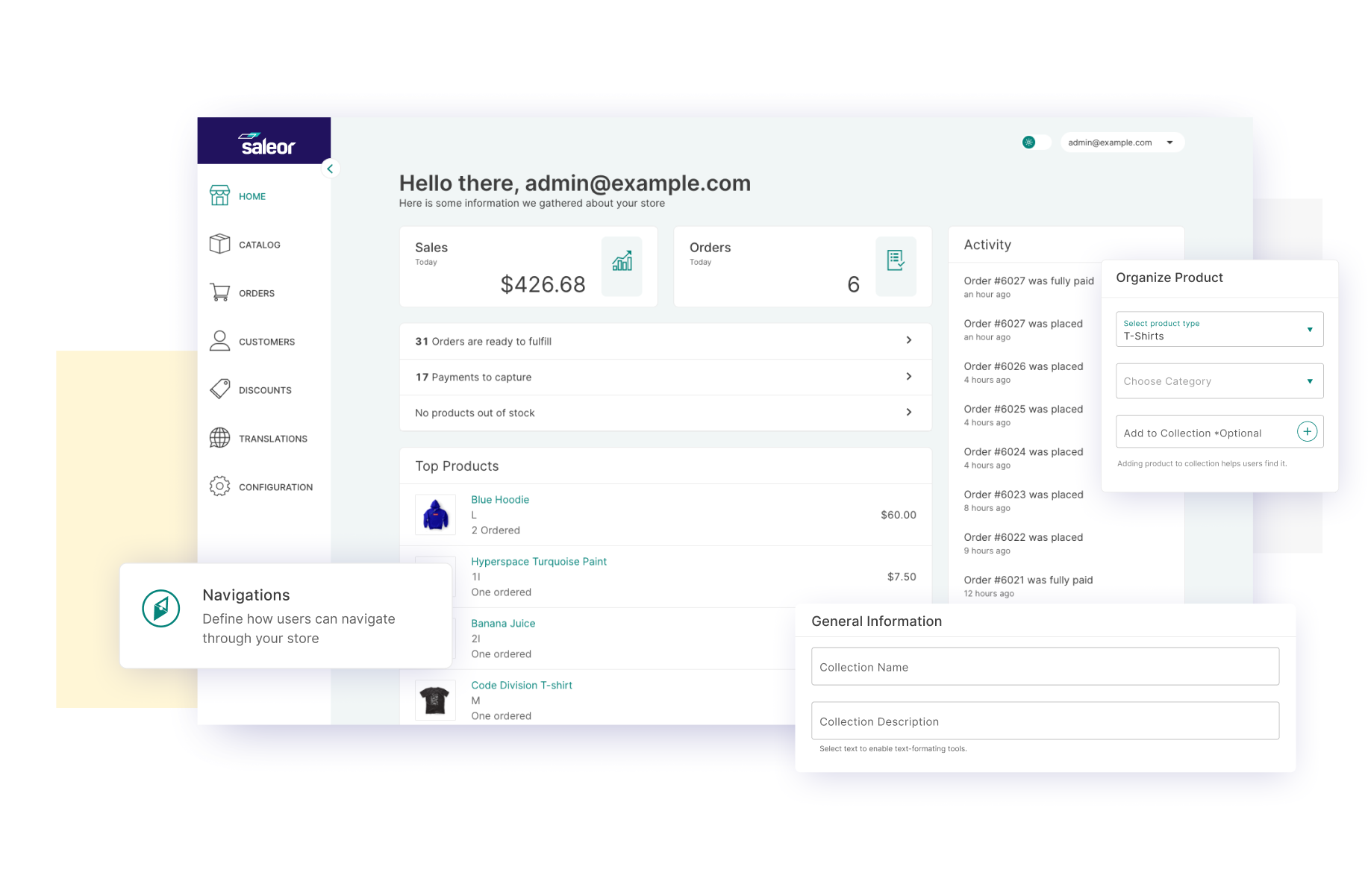
Solar is an open-source GraphQL-first eCommerce system for building a personalized shopping experience.
Solar is built on top of Django (Python Web Framework), GraphQL, and React.
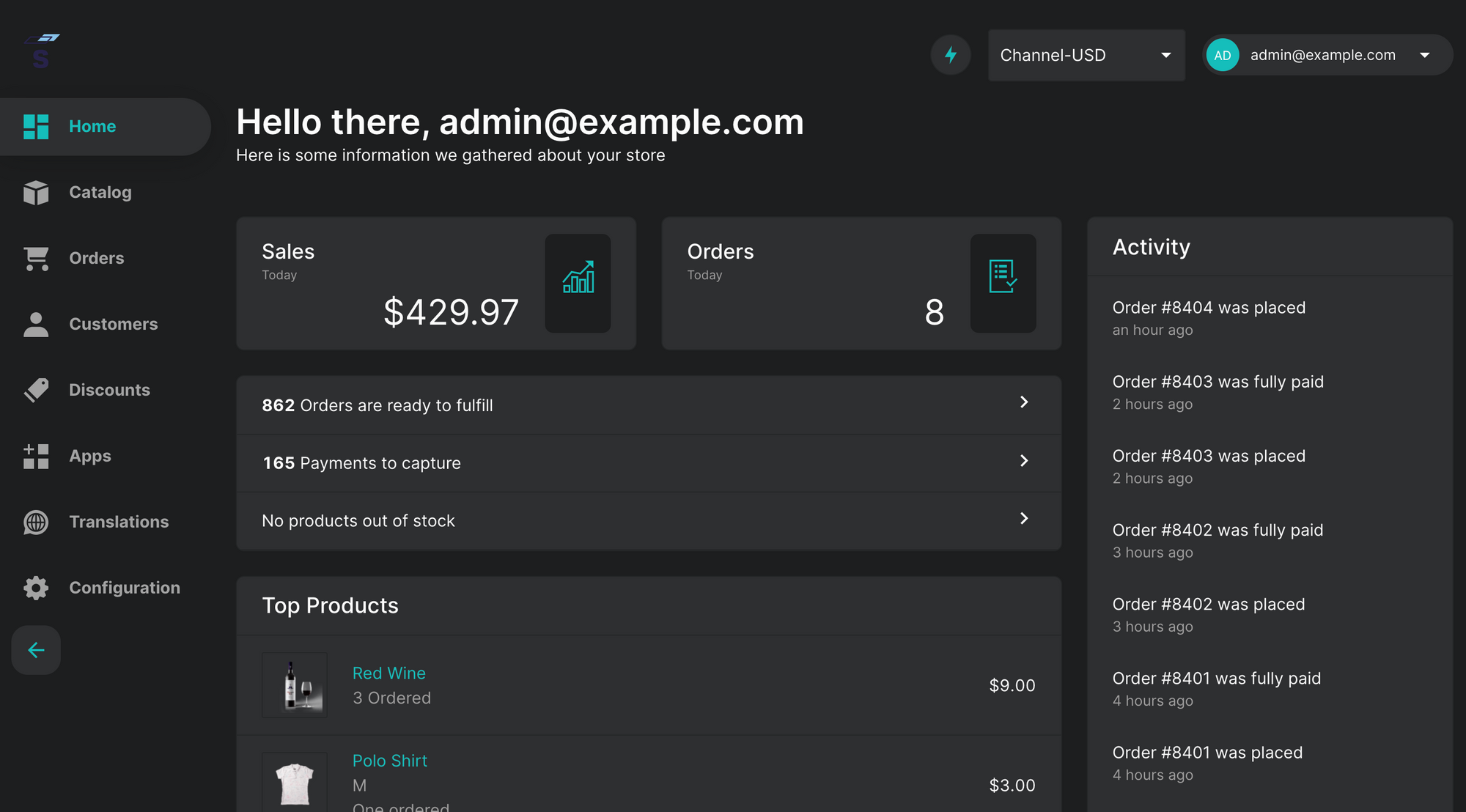
Salor Highlights
- Easy setup
- GraphQL API
- Payment management
- SEO custom fields
- Customer management
- Cart management
- Google Analytics integration
- PWA support
- Discount management
- Apps management
- Multi-translation support
11- Aquila CMS eCommerce

Aquila CMS is a hybrid content management solution built with a MERN development stack and uses MongoDB.
Aquila CMS offers a rich back-office to manage the CMS and eCommerce solutions.
Aquila Highlights
- Product management
- Rich dashboard
- Complete order management
- Payment management
- Cart manager
- Discount management
- Email notification
- Custom CMS pages
- Built-in front-end

12- Shopizer

Shopizer is a Libre API-first eCommerce system that aids developers in building B2C, B2B, C2C, marketplaces, and multiple storefronts.
Shopizer is built on Spring (Java web framework) and offers a complete AWS cloud install with S3 and MySQL RDS for database backends.
Shopizer Highlights
- REST-API
- Container-based apps
- Azure or Google Cloud Platform (GCP)
- Docker container support
- Runs from any Java servlet container
- Product catalog management
- Shopping cart management
- CMS manager
- Dozens of marketing components
- Order management
- Payment follow-up
- Shipping cycle manager
- Elastic search support
- Multi-lingual support
13- GetCandy

GetCandy is an eCommerce system based on Laravel, the popular modern PHP framework.
GetCandy offers a RESTful API with Open API specification as a separate package for Laravel developers to integrate and use in their projects.
GetCandy Highlights
- A plugin API to extend
- Customizable admin front
- Uses Elasticsearch
- Highly customizable REST API
- Ready to integrate with Laravel projects
- Highly customizable

14- AbanteCart
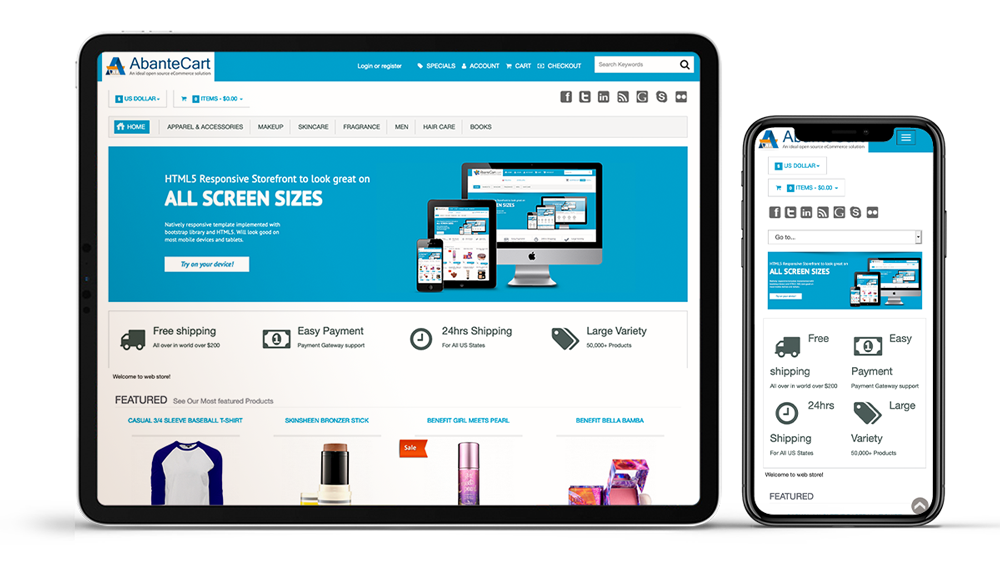
AbanteCart is a full eCommerce system with a hybrid headless mode. It overs built-in PayPal and UPS support.
AbanteCart highlights
- Complete eCommerce system
- Responsive UI
- Storefront and API modes
- Marketplace for extensions
- Embedded Shop code in any web app
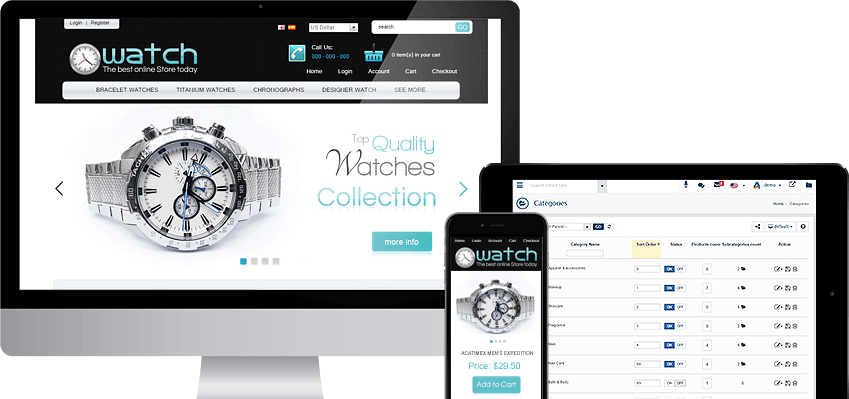
15- Magento

Magento is a popular complete open-source eCommerce system for enterprises. However, it offers complete headless API support for building custom stores and personalized eCommerce experiences.
Magento highlights
- B2B support
- Dozens of B2B modules and extensions
- Rich documentation
- Strong world-wide community
- REST API with a complete headless mode
16- Spurtcommerce
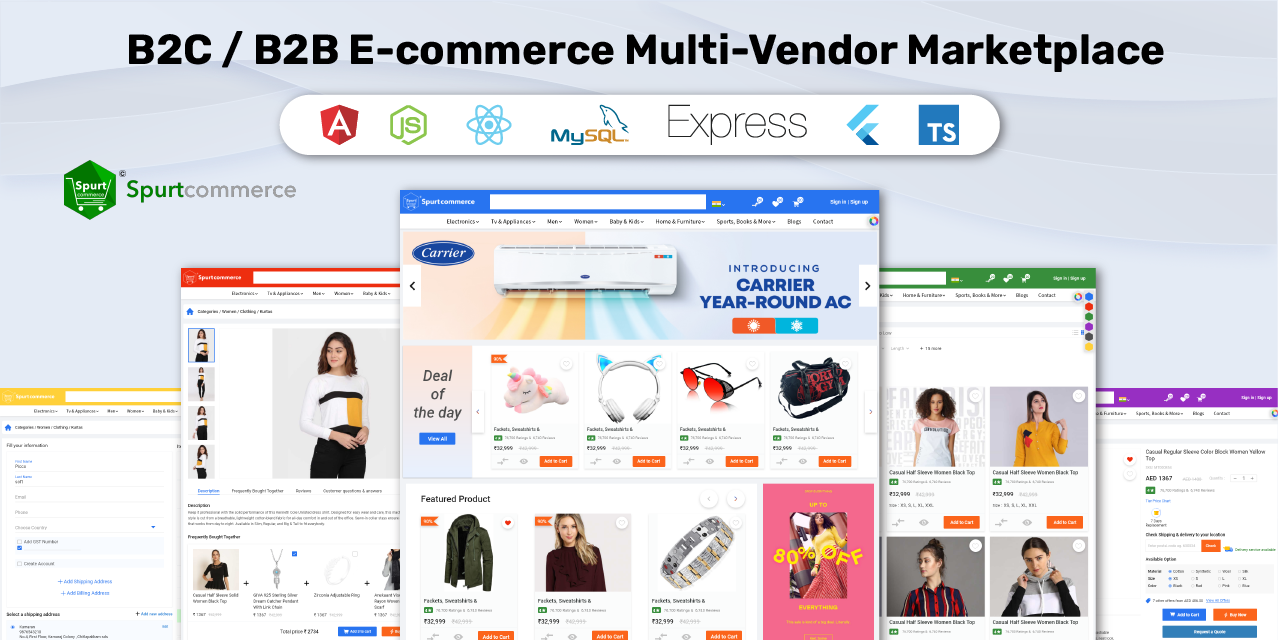
Spurtcommerce is an open-source headless solution that supports Business-to-business (B2B), Business-to-consumer (B2C), Customer-to-customer (C2C), and Consumer-to-Business (C2B).
Spurtcommerce offers an open-source community edition as a free download and an enterprise edition.
Spurtcommerce highlights
- Admin control panel
- Storefront
- API
- Community edition and Pro edition
- Multiple commerce models
17- QOR
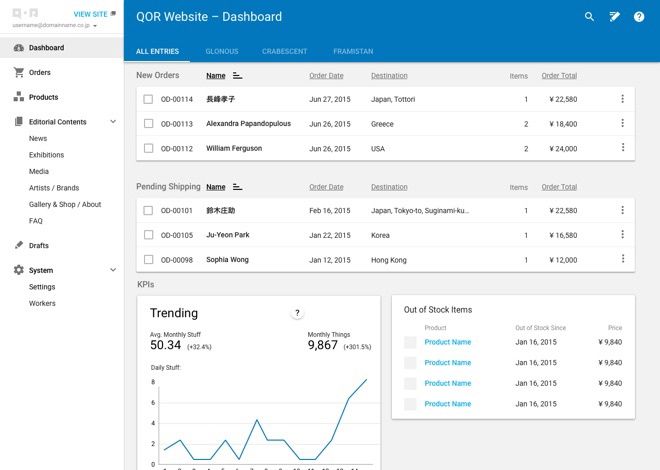
QOR is an open-source Go based SDK for building business and eCommerce apps.
It may not look eCommerce ready like other solutions here, but it settles as a base for building custom complex eCommerce and shopping apps.
QOR Highlights
- A configurable admin dashboard
- Custom workflow and business processes
- Worker manager for batch processing
- Rich media library support
- Data exchange engine with full import and export
- Advanced access-control list (ACL)
- Internationalization(i18n)
- Localization(l10n)

Conclusion
Headless eCommerce solutions are built to save enterprises and developers a large sum of money. But as they differ in features and options, we recommend going thoroughly each of them to choose the right one.
If you know of any other open-source headless eCommerce solution that we didn't mention, please email us, and we will gladly add it to our list.








